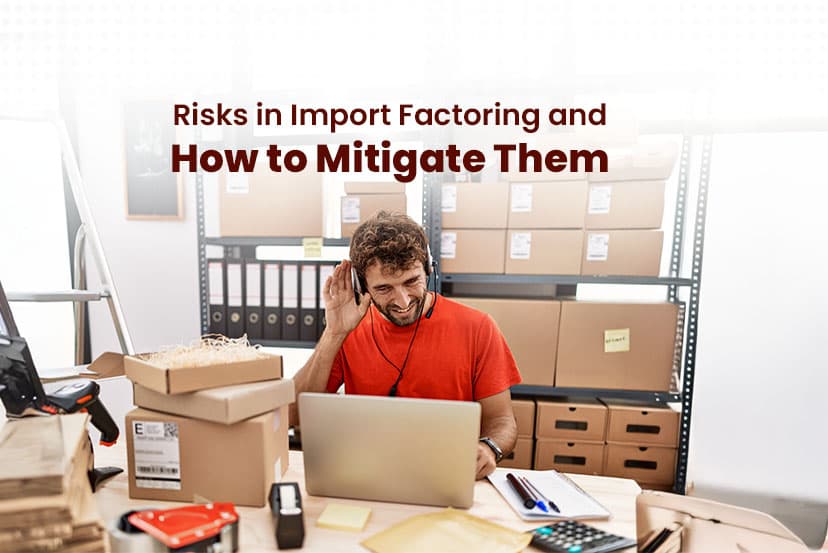In a globalized economy, import factoring continues to be an important financial strategy for organizations seeking to maintain liquidity through the conversion of foreign invoices into cash flow. Import factoring possesses many benefits in companies; nevertheless, it entails certain risks that can negatively disrupt a company’s operations and affect profitability if not managed correctly. In this guide, we’ll discuss the types of import factoring risks, as well as guidelines for the effective management of those risks.
What are the Key Import Factoring Risks?
Import factoring, particularly across international borders, presents to the importer and the factor a combination of financial, operational, and regulatory risk. Key import factoring risks include:
- Credit Risk
Credit risk refers to the possibility that the customers or buyers will be unable to meet the terms of the invoice payment, either by failing to remit payment on time or defaulting altogether. Credit risk in import factoring is of paramount importance because it is the factor that ultimately relies on collecting payment to pay down its advances and its fees.
- Credit risk is higher when buyers have poor credit histories or are from areas of poor economic stability.
- Delays or defaults can negatively impact not only returns for the factoring company but also damage the importer’s reputation and future trade relations.
- If the buyer is not fully open in providing credit history to the importer and if credit information about the buyer is not generally available, then the factor cannot easily ascertain the extent of credit risk.
- Foreign Exchange Risk
When it comes to import factoring, cash flow and profit can be dramatically impacted by foreign currency fluctuations.
- Exchange rates may quickly turn unfavorably in the instance of an invoice before payment; depreciation decreases the factoring company’s and importer’s potential returns.
- Volatile currencies contribute additional unknowns to both pricing goods and managing finances.
- While hedging programs are possible, they also create extra costs while requiring more sophistication to use.
- Legal and Regulatory Risk
Import factoring transactions entail operating in an increasingly complex world with multiple legal systems and trade regulations to contend with, in which compliance is necessary.
- Different states have different legal and documentation requirements associated with factoring contracts, which makes collecting and limiting your exposure all the more distracting.
- Importers and factoring companies can experience unpredictable delays arising from jurisdiction conflicts, enforcement issues, or trade sanctions.
- Changes begin to happen when there are new requirements, such as sanctions, tariffs, or restrictions, including anti-money laundering.
- Import agreements require greater attention to detail in defining payment terms, recourse options, and dispute terms.
- Fraud and Verification Risk
The risks for fraud increase significantly in international factoring because of the complexity and difficulty in verification:
- Incorrect or false invoices can lead factoring companies to be misled.
- Suppliers or buyers can be fictitious or be involved in identity theft.
- Trust cannot be assured about any shipment, and you can be seriously harmed if someone provides a faux shipment.
- There are always unknown risks due to a lack of sufficient due diligence and document verification.
- Political and Economic Risk
Additionally, significant import risks may also arise from geopolitical and economic volatility for a buyer or supplier country.
- For example, a sudden change in political perspective could result in payment freezes, blocked payments, or defaults associated with the assets.
- The likelihood of a buyer defaulting increases if the market is declining, since the demand may be too weak.
Key Risk Mitigation Strategies in Import Factoring
Successful risk management in import finance requires a combination of strategic, operational, and technological dimensions.
Reducing Credit Risk
Taking proactive steps to assess and limit credit risk in import factoring will ultimately limit the potential for defaults and late payments.
- Perform a detailed credit check using both global and local credit agencies, a trade report, and payment history with the buyer.
- You can also reduce credit risk through diversification of buyers and markets across regions and industries.
- Consider using trade credit insurance, structured limits of credit risk, or insurability to cover the event of insolvency.
- Have clear contractual language regarding terms of recourse and non-recourse factoring to properly allocate risk.
Managing Foreign Exchange Risk
Currency risk management in import finance assists in protecting the value of the transaction and cash flow timing predictability.
- When using import factoring, use hedging techniques such as forward contracts, options, and currency swaps, etc., depending on the size and exposure of the transaction.
- Negotiate the currency of the invoice for either a stable currency or the preferred currency.
- Analyze currency trends frequently, and alter prices or contract terms as needed.
Addressing Legal Compliance
Establish foreign-origin contracts that ensure compliance with international trade laws.
- Engage experienced legal counsel with the knowledge of terms of cross-border factoring law, trade sanctions, and to comply with the law.
- Draft comprehensive contracts that address the payment, recourse, jurisdictional, and dispute resolution terms.
- Review and update your ongoing compliance with the trade policies and sanctions policy periodically.
- Use automated compliance platforms that validate trade documentation and assist with ongoing tracking and reporting for compliant trading.
Fraud Prevention and Verification
Minimize exposure to fraud through the use of technology and informed diligence in verification.
- Establish multiple verification levels both for the invoice and shipment through audit, inspection, and digital authentication.
- Continue background checks on counter parties throughout the business relationship.
- Use a secure digital platform for any document exchange to help prevent later tampering with the documents.
- Employ fraud detection software that uses artificial intelligence to monitor transactions for the detection of fraud.
Addressing Political and Economic Risks
Anticipate geopolitical and macroeconomic shocks to protect your receivables and mitigate factoring risk.
- Secure political risk insurance of expropriation/delay in payments, currency convertibility, etc.
- Diverse buyers’ priorities and markets to decrease exposure to high-risk countries.
- Be mindful of risk in using geopolitical analysis to inform economic forecasting for predicting risk toward any interruption of service.
- Consider negotiating flexible contracts that would allow for changes during any political or economic crisis.
Professional Partnerships in Risk Management in Import Finance: The Credlix Advantage
Credlix provides specialized import factoring combined with full import factoring risk mitigation solutions for your global trade transactions.
- Utilizing extensive databases and analytics capabilities to effectively screen for credit risk in import factoring.
- Provides currency risk tools and hedging assistance to stabilize your financial outcome.
- Assists clients through the complexity of compliance issues internationally.
- Working with multiple insurers and advisors to provide diversification and mitigate risk.
Securing Your Import Finance with Confidence
Import factoring provides essential liquidity and protection against credit risk, but there are risks, including currency fluctuation exposure and legal and fraud challenges. Knowing the risks you are facing and pre-emptively assessing and mitigating them will allow you to leverage the opportunity that import factoring offers while remaining secure.
If you have done thorough credit checks, hedging, compliance due diligence, and fraud prevention measures, then import factoring may very well be a strategic approach to sustainable growth. When working with a trusted partner such as Credlix, your business receives risk management expertise along with tailored import factoring services.
Frequently Asked Questions
Q1: What is the biggest risk in import factoring?
The biggest risk will always be credit risk – buyers may not pay the invoice at all or within the specified timeframe.
Q2: How can foreign exchange risks be managed?
Through hedging instruments such as forwards, options, currency swap agreements, and considering invoicing in a strategic currency.
Q3: Why is political risk important in import factoring?
Political instability and regulatory changes may either halt payments or create defaults, so it is countered by obtaining insurance from the factoring company or diversifying risk.




